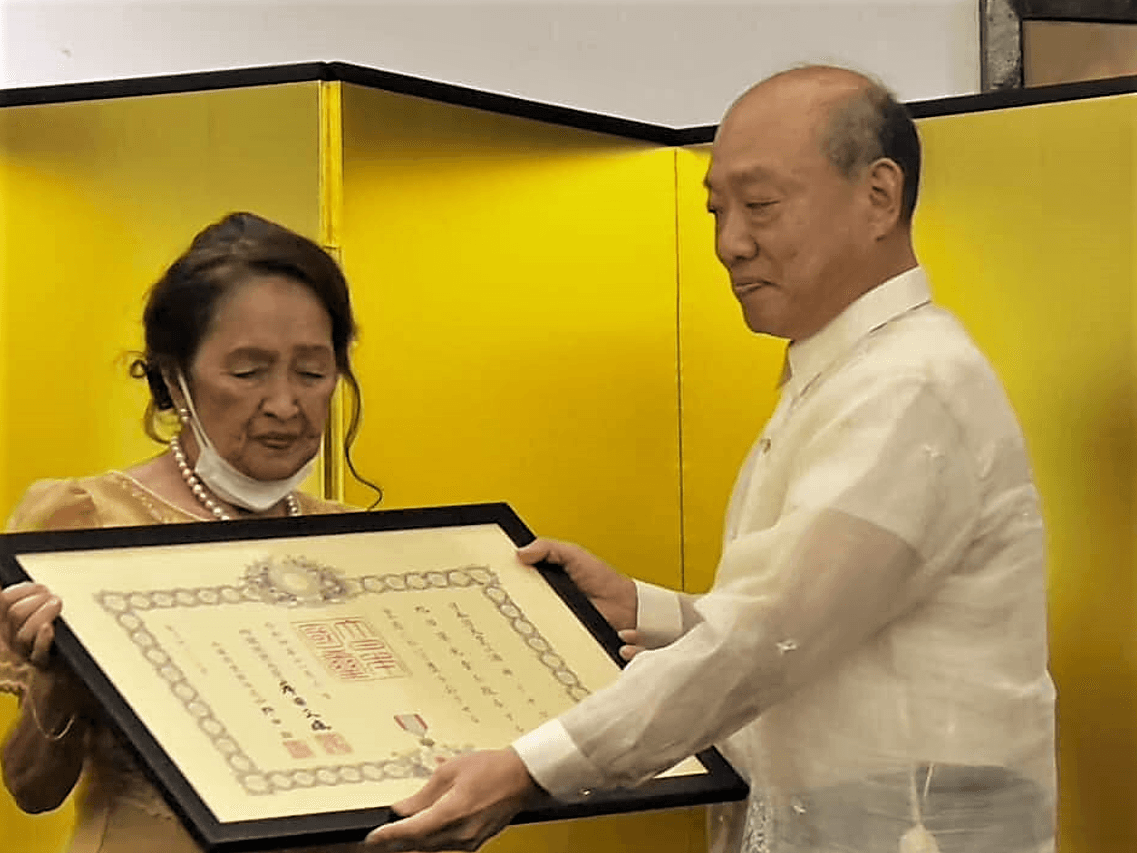SUMMARY
This is AI generated summarization, which may have errors. For context, always refer to the full article.

GENERAL SANTOS, Philippines – World War II marked a turning point for the family of Japanese-Filipino Estelita Michiko Sakai-Roales.
The eldest of four siblings, Michiko’s family enjoyed a comfortable life in Dansalan where her Japanese father, Hiroo Sakai, and mother, Primitiva Yañez of Cagayan de Misamis, had established a hardware store in the 1940s.
Dansalan is the old name of the predominantly Muslim Marawi City, while Cagayan de Misamis was a town that became the present-day Cagayan de Oro City.
Everything changed, however, when the war broke out and invading Japanese soldiers took her Shibuya-born father and turned him into an interpreter.
The family store closed shop when their father was given assignments and brought them with him on his travels from Marawi to Malaybalay in Bukidnon, and Malabang town, Lanao del Sur, where the Japanese Imperial Army maintained a garrison.
It was in Malabang when the war ended that Michiko’s father lost contact with the family.
Michiko’s mother Primitiva subsequently brought her children to Cotabato for easier access to medical facilities because their youngest brother was always sick.
But Michiko and her siblings faced anti-Japanese sentiments as a result of the invasion. As Japanese descendants, they were victims of discrimination by other children, who would throw stones at them just because of their roots.
Growing up as a teenager in Cotabato City, Michiko went to high school at the Notre Dame Girls’ Department.
It was in the same city where she met her future husband, Juan Jose Roales. After seeing a photograph of her displayed in a local photo studio, Juan Jose went around town looking for her, and when he did, he never let go. They eventually married and had seven children.
Decades after the war, Michiko was reunited with her father’s sister, Aiko, and other relatives in Tokyo.
Michiko’s daughter, Maria Dolores Roales, said her mother’s experiences as a young Japanese-Filipino had a lasting impact and inspired her to help other Japanese descendants in Mindanao who were struggling to survive.
Her experiences during the war and the discrimination she faced, as a result, prompted her to travel to remote villages to locate fellow Nikkeijin (second-generation descendants of Japanese who migrated to the Philippines before or during World War II) and listen to their stories.
“My mother learned there were other descendants who were in poverty and struggling to survive. This is what drove her to help,” Dolores told Rappler on Wednesday, March 29.
Despite the challenges, Michiko helped others like her, particularly the needy, find their relatives and obtain Japanese citizenship so that they could seek a better life in Japan. Specifically, she helped many Nikkeijin in Cotabato gather documents and comply with other requirements so they would be recognized by the Japanese government.
Michiko was recognized by the Japanese government for her tireless efforts and years of work to improve the welfare of her fellow Nikkeijin in Mindanao, helping them trace their roots and find their relatives in Japan.
Her good deed earned her the Kyokujitsu-shō (The Order of the Rising Sun, Silver Rays), one of Japan’s highest honors, conferred upon her by Japanese Consul-General Ishikawa Yoshihisa on behalf of Emperor Naruhito in Davao City on Sunday, March 26.
“In recognition of her exemplary work and accomplishments, the government of Japan extends its sincere congratulations to (Michiko) who indeed deserves the Order of the Rising Sun, Silver Rays,” read a statement from the Japanese Consulate in Davao.
The award, established by Emperor Meiji through a decree of the Council of State on April 10, 1875, is conferred only to a select few who have rendered distinguished service to Japan in various fields except military service.
Michiko, who still lives in Cotabato City, served as the first president of the Cotabato Nikkeijin Kai, an association of war-displaced Japanese descendants that has been helping Nikkeijin obtain their Japanese nationality.
After accepting the award, Michiko thanked the Japanese government for opening doors to many Nikkeijin like her who wished to return to Japan, and for honoring her. Her family and Foreign Affairs Assistant Secretary Renato Pedro Villa were present to witness the conferment of the order. – Rappler.com
Add a comment
How does this make you feel?










![[Hindi ito Marites] Japan: From enemy to bestie](https://www.rappler.com/tachyon/2024/07/Hindi-ito-Marites-TC-ls-7.jpg?resize=257%2C257&crop=415px%2C0px%2C1080px%2C1080px)


![[Rappler’s Best] America](https://www.rappler.com/tachyon/2024/07/rapplers-best-america.jpg?resize=257%2C257&crop=458px%2C0px%2C1080px%2C1080px)

![[OPINION] From ‘Puyat’ to ‘Tulog’: Clout-chasing street signs disrespected history](https://www.rappler.com/tachyon/2024/07/gil-puyat-july-26-2024.jpg?resize=257%2C257&crop=389px%2C0px%2C1080px%2C1080px)


![[Time Trowel] Yamashita gold is a myth, and treasure hunting is not archeology](https://www.rappler.com/tachyon/2024/06/myth-yamashita-treasure-june-14-2024.jpg?resize=257%2C257&crop=435px%2C0px%2C1080px%2C1080px)
There are no comments yet. Add your comment to start the conversation.